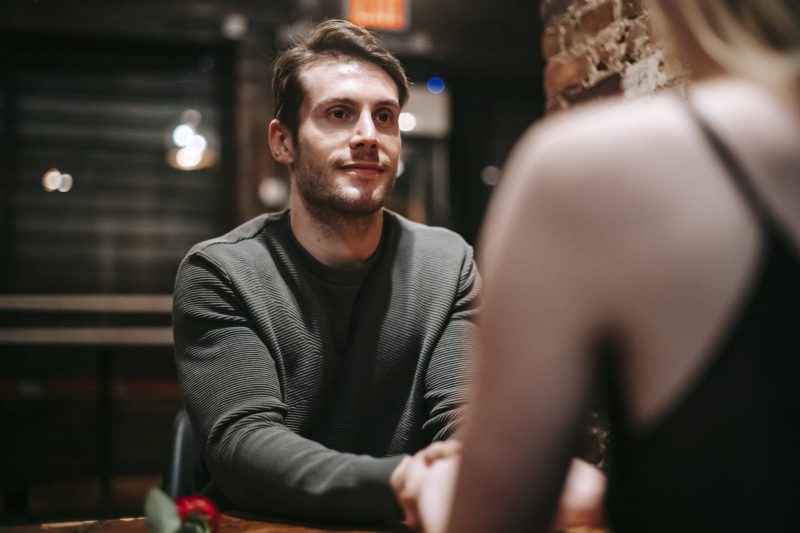Pre-Date Preparation
To prepare yourself for a successful first date with the right impression, the Pre-Date Preparation section with the title “What do you talk about on a first date?” with sub-sections that cover Appearance, Conversation topics research, and Pre-decision on technology usage will guide you in your endeavors.
Appearance
When it comes to looking your best for a date, it’s essential to consider elements that can enhance your natural beauty and confidence. To make sure you don’t miss out on anything, use a checklist!
Appearance-wise, think about grooming, clothing, posture and accessories. For grooming, shave and trim hair. For clothing, choose an outfit that suits the date and place. Match accessories like jewelry or shoes. Posture has a big effect on how you come across, so focus on that too.
To get an idea of what to wear, and what not to, check out the table below:
| Category | Item/Action |
|---|---|
| Grooming | Shower Hair Care Skin Care Trim/Shave |
| Clothing | Outfit Selection Clean Clothes Fitting Clothes Weather-appropriate Attire |
| Accessories | Jewelry/Watches Perfume/Cologne Bags/Purses/Shoes/Hats/Sunglasses/Wallets |
| Posture | Eye Contact Sit Straight/Stand Tall Avoid Fidgeting/Nervous Habits |
Enhancing your outward appearance is key to feeling confident and good about yourself before a date. Plus, it’ll help turn heads with minimum fuss! Finally, don’t forget to research conversation topics for a first date – it’s like studying for a final exam, but without being able to cheat!
Conversation topics research
Prep for that date! Research convo topics that your partner will love. Look for common interests, current events, and passions. Show interest in their perspective to build a connection. Stay away from taboo topics like politics, finances or religion.
An alternative: research their social media or ask mutual friends what they’re into. Saves time and gives insights into their personality.
Did you know? Plenty of Fish says 78% of singles think convos are key to successful dates.
Tinder or Bumble? It’s like picking between a dumpster fire and a landfill.
Pre-decision on technology usage
Before a date, it’s essential to make a plan for tech usage. This includes figuring out how much phone usage is okay, particularly with social media and messaging apps. It’s also important to set expectations with your partner in advance.
To have a great and distraction-free experience, try to use phones as little as possible. Put it on silent or put it away. In case of emergencies, discuss these scenarios with your partner beforehand. By setting boundaries with tech, both of you can stay present and engaged.
When preparing for the date, think about location and activities. Using phones less is better in formal settings, but a casual activity like mini-golf may allow for more flexibility. Check in with your partner throughout the night to make sure everyone is comfortable.
Pre-date preparation is important for future interactions. By limiting tech usage and discussing expectations first, couples can build trust and respect. Don’t miss out on an authentic connection – prepare for your next meeting!
First date Conversation starters
To steer clear of that awkward silence on your first date, you need some great conversation starters. For that, you can delve into several amazing and thought-provoking sub-sections – Hobbies and Interests, Career aspirations, Travel, Food and beverages, and Current events. Each sub-section offers fresh, interesting and stimulating talking points that can help you know more about your date and keep the conversation flowing.
Hobbies and Interests
On a first date, your passions and fascinations can be a great conversation starter! Talk about the things that ignite your fervour and you’ll reveal a bit of yourself to your partner, while learning more about them.
Mention activities that you genuinely enjoy in your free time. This can be a chance to discover shared interests or something new. Don’t be shy! Talk about the excitement of attending live concerts or visiting museums when travelling. Explain what inspires your love for an activity or what your long-term goals are.
Did you know that couples who have shared interests often have longer-lasting relationships? Who needs a career when you can just marry rich and start your own collection of designer handbags?
Career aspirations
When talking about one’s professional goals, ask about their ambitions and aspirations. It’ll show their values, work ethic and personality. Ask open-ended questions that encourage thoughtful responses. Don’t limit the discussion to job titles or income expectations. Explore why they chose a particular career path or what motivates them in their work life. Listen actively and show genuine curiosity.
Everyone has different professional experiences and aspirations, so avoid assumptions based on past work history or education background.
For example, on a first date, I asked someone who worked in finance about their long-term aspirations. They wanted to pursue sustainable investments and become part of the growing movement towards socially responsible funds in their industry. We discussed how financial institutions can use capital for positive change while still making profits- it highlighted our shared values of promoting social good in our respective fields.
Asking open-ended questions with genuine interest can uncover unique facets of someone’s persona.
Travel
Ready to be stimulated? Let your date know of your love for exploration! Talk about your excitement to travel and the unique experiences awaiting in various parts of the world. Share your favorite destinations, like trekking in the Himalayas or sipping wine in Paris.
Delve into cultural idiosyncrasies. For example, South Americans may be big on public displays of affection. Or, Asian cultures may have intricate tea ceremonies. Discuss local cuisine, too, such as poutine in Canada, or street food in Thailand.
Mention off-the-beaten-path locations, like picturesque villages, secluded beaches, or temples hidden in mountains. Share a thrilling experience, like skydiving over New Zealand or whitewater rafting through the Grand Canyon.
Listen attentively to your date’s tales from their travels, as they may persuade you to visit a new place! Create an exciting connection by telling engaging travel stories and learning more about theirs.
Food and beverages
Food and Drink: an essential part of a first date. Consider your date’s preferences when selecting the venue and menu. Small plates or ordering for each other can build intimacy. Avoid overindulging in alcohol. Pick an environment that reflects your personality and is comfortable for both. Ethnic cuisine or unique experiences can spark interesting conversations. Ask open-ended questions. Don’t forget basic table manners. Account for dietary restrictions.
A Zagat survey reveals 56% of American couples discover their desirable meals based on their partner’s preferences, illustrating how vital food choices are in relationships. So why not skip the small talk and debate which superhero would make the best wingman?
Current events
Talking about the latest happenings is a great way to start a first date. From politics to sports to entertainment, there’s always something to discuss. It’s best to remain neutral and keep controversial opinions to yourself. Ask open-ended questions to encourage dialogue and exchange of ideas. You can still share your opinion, but make sure to be respectful. Don’t forget to add some light-hearted news for a bit of fun – but don’t ask about their exes! Keeping up to date on current events can make your date more enjoyable.
Questions to avoid asking on a first date
To avoid any awkwardness on a first date with someone new, it’s important to steer clear of any sensitive topics that may make things uncomfortable. That’s where this section of “Questions to avoid asking on a first date” with sub-sections on “Personal finance,Previous relationships,Religion and Politics” can come in handy as a solution. Let’s explore these sub-sections briefly to understand why they’re best left unasked on a first date.
Personal finance
Asking someone about their financial situation on a first date can be uncomfortable. Avoid questions related to wealth, salary and income inequality as these can be intrusive and make the other person feel judged. Talk about common interests, career pursuits or hobbies instead to build a connection.
Don’t discuss your own financial situation too much either. Share some details about your career aspirations and passions, but save money-related discussions for steady relationships.
Personal finance is more than bank accounts and credit scores; it’s also about values, ethics, priorities and cultural beliefs surrounding money management. Conversations about these topics too early can put pressure on both parties.
Almost three-quarters of Americans listed money as a significant source of stress, making it easy to understand why bringing up money-related issues with a new romantic partner is unwise.
It’s understandable to mention personal finance topics during a first date, but don’t do it too soon – it can be awkward. Unless you want to hear about the time they dated a con artist or their ex who collected toenail clippings – avoid the previous relationships topic.
Previous relationships
When it comes to first dates, it’s wise to avoid questions about romantic history. Asking about previous partnerships or breakups can be uncomfortable for your date. Plus, it might not be a great look for you.
Rather, focus on the present. Ask open-ended questions about their hobbies, interests and aspirations. This will help you get to know them better.
Each person has their own experiences. So, questions about past relationships can bring up negative emotions or trauma. Stay respectful. Keep things positive by steering clear of topics that could ruin the mood.
Do not bring up religion or politics on a first date. Save that chat for the second anniversary!
Religion and Politics
On a first date, it’s key to steer clear of topics that may lead to uncomfortable discussions. Religion and politics are two such subjects. Questions on them can cause disagreement or offense, potentially ruining the chance of a budding relationship.
It’s best not to inquire about someone’s faith or political leanings. Even clarifications may damage the mood. Switch to discussing positive experiences instead. Discussing hobbies, books or movies can help build an enjoyable connection without offending your date.
As reported by Personal Dating Magazines, religious and political disagreements can end relationships. Chris Pratt and Anna Faris divorced partly due to differing opinions on religion. Therefore, it’s vital not to start an argument during your first date.
If your date’s body language says ‘get me outta here‘, it’s probably time to wrap things up.
Body Language and non-verbal communication on a first date
To understand how to communicate non-verbally on a first date, turn your attention to your body language. Utilize eye contact, gestures and postures, and timing to convey your message. Paying attention to these elements of nonverbal communication will help you make a lasting impression and create a deeper connection with your date.
Eye Contact
The power of gazes in non-verbal communication is remarkable. Eyes are like windows to one’s soul. Therefore, eye contact is a critical aspect of body language on first dates. Staring into each other’s eyes can create trust, empathy, and a strong bond.
Maintaining balanced eye contact during a conversation expresses active listening and interest in the person. It’s important to note the intensity of eye contact as it can have various cultural interpretations. Some cultures find long gazes impolite. Most people appreciate it when others pay attention to them through eye movements.
The Journal of Nonverbal Behavior reports that we form opinions about people’s personalities based on their eyes’ features. People often think those with bigger pupils or longer gazes are more agreeable.
A study from Aberdeen University proved that lengthy stares set up an intimate atmosphere between strangers, even without words.
Did you know? Forbes Magazine’s research shows 70-90% of all communication is nonverbal. On a first date, crossed arms may indicate disinterest, but crossed legs may just mean you need to pee.
Gestures and postures
On a first date, it is critical to note that non-verbal communication elements such as body language and postures can communicate much. Thus, it is essential to adopt appropriate ones to express sincerity and interest.
- Avoid crossing your arms, as it sends signals of defensiveness.
- Maintain eye-contact with your partner, to show you are interested in what they have to say.
- Smiling helps create a welcoming atmosphere and expresses positive vibes.
- Keep arms and legs relaxed and uncrossed, projecting an open-minded outlook.
- Mirroring your partner’s sitting positions can create a sense of comfort for both.
Princess Diana used non-verbal cues to convey her disinterest in Prince Charles. She avoided physical contact or prolonged touching. Her non-engaging behavior sent a subliminal message of non-interest.
Thus, when it comes to first date body language, timing is everything.
Timing
Humans possess natural instincts to determine when the perfect time is for different activities, including dates. Timing during non-verbal communication on a first date can make or break a relationship. Eye contact, subtle movements and touches must be timed correctly to create trust and rapport with your date.
Timing is composed of two aspects: pacing and direction. Pacing is the rate and rhythm of your actions while interacting. The right pace brings comfort and trust, while too fast or slow pacing displays discomfort or disinterest.
Direction refers to the flow of non-verbal cues during the conversation. It is essential to time it properly, as it helps to build attraction between both individuals. Directing non-verbal communication correctly can lead to further intimacy, spark interest, increase chemistry and boost cohesiveness.
When done right, body language on a first date offers an opportunity for deeper connection and understanding between potential partners. However, rushing things through talking or physical touch can turn off partners and ruin the chance of gaining full attention.
To make sure that you communicate effectively with your potential partner on your first date, it’s important to note all verbal and non-verbal communication and the timing of those signals. This enables a better chance of fostering commonalities, which are necessary for forming and maintaining a long-term relationship. Listening is an art, but actively listening on a first date is like an Olympic sport!
Active Listening on a first date
To be an attentive listener and make a good impression on a first date, active listening is imperative. In order to achieve this, solutions like avoiding distractions, asking follow-up questions, and sharing similar experiences are crucial to show your interest in the conversation.
Avoid distractions
Maximize Engagement on a Date – Minimize Distractions!
- Turn off all electronics. Silence devices like phones and smartwatches.
- Choose a quiet spot. Find a secluded location with minimal noise.
- Maintain eye contact. Focus on your date by keeping eye contact throughout the conversation.
- Be present. Avoid common distractions like notifications.
- Prepare topics. Have potential topics ready for awkward moments.
- Don’t script. Don’t make it too much like an interview.
- Be intent. Form deeper connections by being present.
Ask follow-up Questions
Active listening during a first date is key! Ask follow-up questions that allow the other person to elaborate and share their perspective. Show genuine interest and curiosity in their thoughts and experiences. Ask questions to reveal common interests or values – this could strengthen the connection.
Engage in conversation with respect; don’t interrupt or ignore their ideas. This will demonstrate empathy and consideration for their viewpoint. Superficial conversations without meaningful connection won’t do. Don’t dominate the conversation with personal stories or opinions – this could lead to an imbalance of power.
Strive for balanced dialogue by thoughtfully listening and responding with relevant follow-up questions. This could foster deeper understanding, and potentially lead to an emotional bond. Studies have shown that couples who engage in active listening during the dating stage tend to establish long-lasting relationships. So use this simple yet effective communication strategy – it could be a major factor in leading you to an affirming relationship!
Share similar experiences
On a first date, deepening connections is key. Drawing parallels and discovering commonalities can help bond two people. Listen and engage in conversation. Show interest in the other person’s experiences. Genuine curiosity may uncover shared interests or perspectives.
When talking, ask open-ended questions. Sharing moments or discussing values creates shared understanding and empathy. Pay attention to your date. Don’t dominate the discussion.
Personal stories have long been used to bond. Share travel tales, family histories, or childhood memories. Through these stories, you can find common ground and make deeper connections.
Active listening is a skill that benefits all relationships. So, put down the phone and pay attention! Otherwise, you may end up alone…with your phone.
Summarizing and including a call-to-action
To summarize and end your date with a positive impression, use these sub-sections as a guide: Recap the conversation, Conclude with a positive and open-ended invitation, and Empathize with your date’s thoughts and feelings. These steps will help you steer the conversation towards a positive direction while showing your interest in them.
Recap the conversation
Let’s review and synthesize the important learning points. Highlighting key action items will help us understand how to act. It’s essential to recognize any remaining issues or questions. Wrapping up this dialogue with a call-to-action could help. Let’s now make efforts towards its realization. Don’t let the fear of missing out hold us back. Join us on this journey of endless possibilities. Every ending is a new beginning!
Conclude with a positive and open-ended invitation
Ending with a positive and welcoming invite could leave an impression and boost the chance of future involvement. Writing an open-ended invitation that speaks to the reader’s interest could improve this outcome. Professionalism is key, and no pressure or obligation should be included to keep the invitation welcoming and open-ended.
Adding an action-oriented call-to-action could help boost audience connection. The CTA must be obvious, not intrusive, and relevant. Examples of suitable CTAs are asking for feedback, recommending related content, or suggesting users to share their stories.
It is vital to note that leaving a good impression when wrapping up an article is important, as it displays the whole content and brand. Writers should consider ways on how readers can engage further while giving them valuable takeaways.
Studies show that including visuals in articles can boost user engagement by 42%. Visuals such as infographics or videos can break up lengthy text, making it easier to grasp information. PR Newswire states that posts with images have around 94% more views than those without images.
Empathy is a way to understand your date’s mind without getting lost in it.
Empathize with your date’s thoughts and feelings.
Understanding your partner’s emotions and thoughts is key for a great date. Listen and show that you comprehend their feelings. This helps you get a better view of their situation, which encourages better communication and a more powerful bond.
Be an active listener. Feedback, reflect, and don’t assume. Show understanding by copying their body language or tone.
Also, express your own emotions. Make it a place where both sides feel at ease talking. This helps achieve an open discussion and strengthens the relationship.
Empathizing with your date’s feelings and ideas is an ongoing process. It’s hard work and takes patience, but it leads to more fulfilling relationships.
I once went on a date where they shared their office struggles. I listened and showed I got it. They felt heard and we went on a few more dates. We built a strong connection based on trust and understanding.
Frequently Asked Questions
1. What topics should I avoid discussing on a first date?
It’s generally best to avoid discussing controversial or potentially sensitive topics such as politics, religion, and ex-partners on a first date. Stick to lighter and more neutral topics such as hobbies, interests, and travel.
2. How can I keep the conversation flowing on a first date?
Ask open-ended questions that invite more than just a yes or no answer. Listen attentively to your date’s responses and build on what they say by adding your own thoughts or experiences.
3. Should I reveal personal information about myself on a first date?
It’s okay to share some personal information about yourself on a first date, but be mindful of oversharing. Keep things light and positive, and avoid dwelling on past traumas or negative experiences.
4. What are some good conversation starters for a first date?
Ask your date about their favorite hobbies, places they’ve traveled to, or their favorite movies, books, or music. You can also try asking open-ended questions such as, “What’s something most people don’t know about you?” or “What’s your biggest dream?”
5. How can I make my first date more fun and engaging?
Try doing something interactive or engaging together, such as playing a board game or visiting an art gallery. You could also plan an activity or outing that allows you to bond over shared interests.
6. Is it appropriate to talk about physical attraction on a first date?
While it’s natural to feel attracted to someone on a first date, it’s generally best to avoid discussing physical attraction in detail. Focus on getting to know your date as a person, and let the physical aspect of your connection develop naturally over time.









